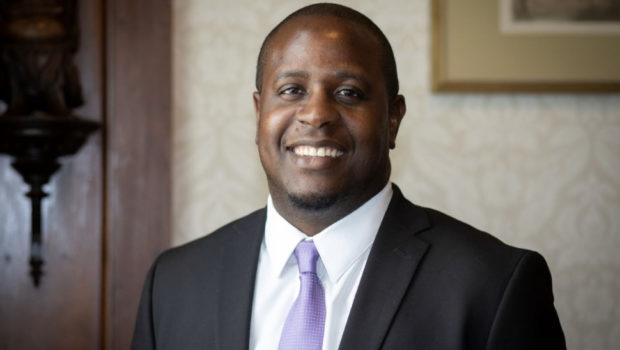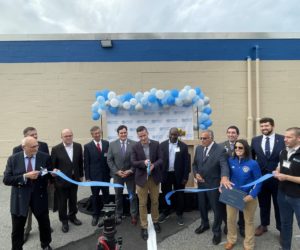In each edition, editorial staff of Chamber Exchange: The Newspaper look to include one question-and-answer-style interview with a Chamber member who’s really making a change in the community. This month, I sat down with Kola Akindele, Assistant Vice President of External Relations and Strategic Partnerships at Worcester Polytechnic Institute (WPI). Below are excerpts from the interview with Mr. Akindele chronicling his upbringing and schooling in Worcester, his work in higher education, his volunteerism efforts, and his passion for this city and its people.
After several years with Hartford HealthCare and UMass Medical School, you recently started in this new role at WPI, but you’re no stranger to Worcester. What’s your connection to the city?
I was born and raised in Worcester. My parents had me here in Worcester. They took me back to Nigeria when I was about a year old and then I came back when I was around eight or nine years old. I went to a number of elementary schools in the city including Vernon Hill and Adams Street School, and then went to Forest Grove Middle School and onto Holy Name High School. I’ve lived most of my life here. I actually grew up right across from WPI. Then I came back to work here at the medical school for about seven to eight years. So I’ve really spent the bulk of my life in Worcester.
What exactly does being the Assistant Vice President of External Relations and Strategic Partnerships at WPI entail?
I oversee the community government foundation and corporate relations functions at the university. WPI has this sort of long-standing history of applying these resources to develop leaders who will make an impact in the world through STEM activities and education. A lot of that work is supported and for the most part funded by corporate partners, foundation partners, and through relationships with our community and government partners. My role is to sort of steward a lot of those relationships, and to build and cultivate them in a central way.
You serve on the Chamber’s Board of Directors as well as a number of other boards and committees. What drives you to stay so voluntarily involved in Worcester and your community?
Given the fact that I was born here and raised here, I have a soft spot for Worcester. I think whenever Worcester does well, it makes me feel better about my home town. Whatever I can do to make sure the community advances, the city advances, and the residents of the city advance, I think I try to do those things. Again, if Worcester does well, I think I do well because I’m from Worcester. It’s sort of this “back home” feeling that allows me to have such a passion for the city.
And your experience with community and government relations isn’t limited just to your job title or your volunteer work. You also ran for Worcester City Council previously. How do civic engagement and political action align with your passions and personal mission?
I think for the community as a whole to advance, everyone needs to feel that they have a voice in the advancement of that community. Every sector, every constituent, every culture, every neighborhood needs to feel like they have a part to play, they have a role, and their voice is heard. Overall, if Worcester needs to advance, I think every part of Worcester needs to play a role in that. Due to my passion for the city to advance, I have this passion to make sure that everyone else within it is civically engaged so that, as a result, the city can move forward.
Part of my work in the past has been to make sure that folks who move here to the city, particularly African immigrants, have a strong voice in the community and are more civically engaged than they usually are so that their voices aren’t left out and they can become part of some of the decisions that are being made.
Over the past few years, there’s been a lot of talk about this so-called “renaissance” that Worcester is experiencing. In your professional and personal roles, how do you work to ensure everyone takes part in this advancement and no one gets left behind?
In my personal role, what I choose to do is make sure I participate and sort of build or create forums in which people can become civically engaged and become aware of opportunities to become civically engaged. Similar to what I cited with The African Council [of Massachusetts] that I helped found, the idea was to make sure that new immigrants from Africa had a chance to get an education as to who their government — specifically their local government — is and understand how that works, and find ways to become more involved in their local government.
In my professional role, I work to make sure that higher ed institutions are part of the conversation when it comes to the economic development of the city and when it comes to the advancement of the city as a whole, too. We are a major component of the city’s advancement, so we want to make sure that we have a voice in some of the conversations being had around pushing the city forward.
Dominique Goyette-Connerty is director of communications at the Worcester Chamber. She can be reached by email here.
This story was originally published in the May 2021 edition of Chamber Exchange: The Newspaper, a quarterly publication of the Chamber. All newspaper editions are archived here.



